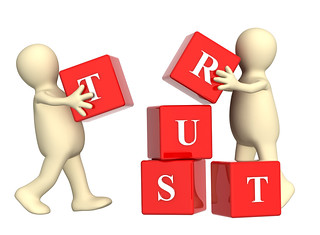How can you develop trust within a group of people who have never met each other?
It is a well-established dictum that "trust is required for knowledge sharing and re-use". In other words, people will share what they know, and act of the knowledge of others, if they know them, if they have a social relationship with them, and if they trust them.
There is another rule of thumb - that it is difficult to form trusting social relationships in groups of more than 150 (Dunbar's number). This seems to be the average size of tribes, military fighting units, and (according to some sources) web 2.0 circles. Within a group of 150, strong social ties of relationship and trust can form.
However that seems to break down when it comes to large online communities of practice within an organisation. Shell CoPs can exceed 2000 members. The US Army "PlatoonLeader.mil" community covers 12000 Platoon leaders. Other companies have communities which are just as large. Dunbar's number would suggest that these communities far exceed the limits of social cohesion, and therefore should not work as knowledge sharing mechanism. Who would trust 12000 people that they have never met?
Yet these communities DO work.
People DO trust them.
People open up to a surprising extent, and share all sorts of things in these large communities, especially the military communities. Somehow it has proven possible to generate trust in a social institution, rather than in social ties with individuals. People trust the community as an entity, even if they don't know the other members well enough to trust them personally.
How to generate the trust
- Firstly the community leaders and facilitators must engender trust. They must be trustworthy themselves, and behave in a reliable, predictable, consistent and positive way.
- The community of practice has to be trusted as "a safe place to be vulnerable"; somewhere people can ask naïve questions without being mocked, and somewhere where disagreement can be explored in a positive way and without flame wars. Again the community leaders and facilitators set this climate through creating and maintaining a behavioural charter.
- The community of practice must build a brand and a reputation as being "a trustworthy means to deliver value"; both to the organisation and to the membership. This is brand is built over years, and the community leader will be instrumental in coordinating brand-building through capturing and publicising success stories.
- Finally the users must get a rapid, quality response to their questions. If they are brave enough to open up to the community of practice - to expose their ignorance and ask for advice and help, for example - then the advice must be quick, and the help must be helpful.





No comments:
Post a Comment